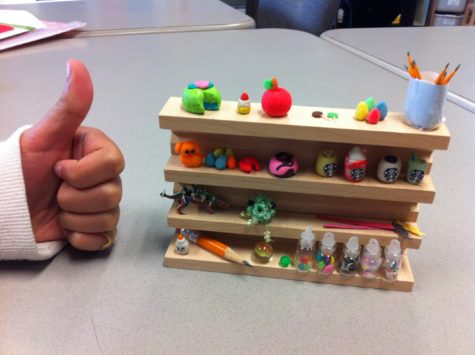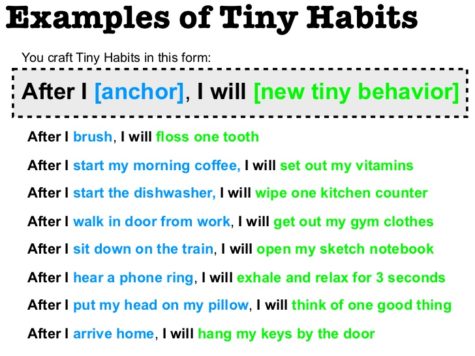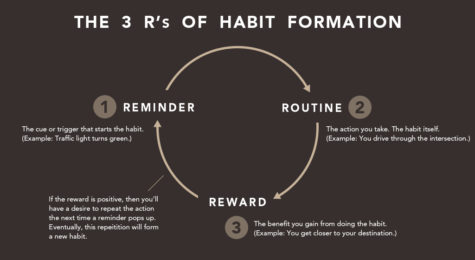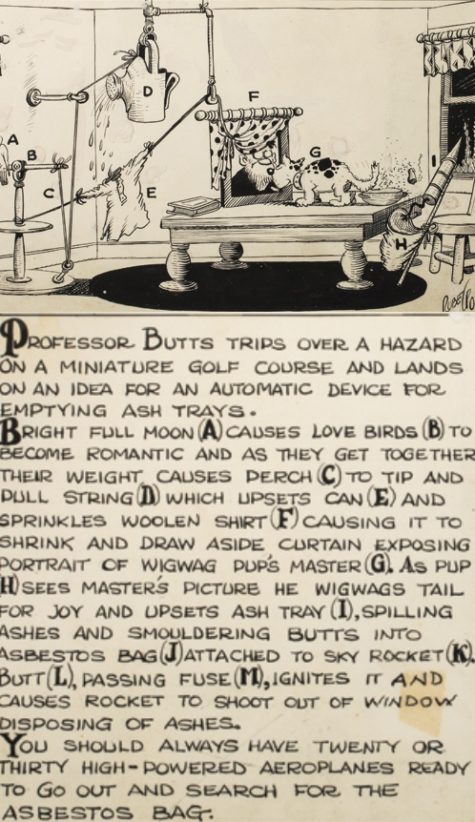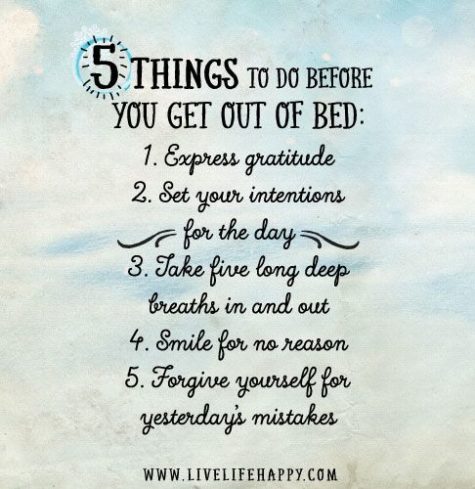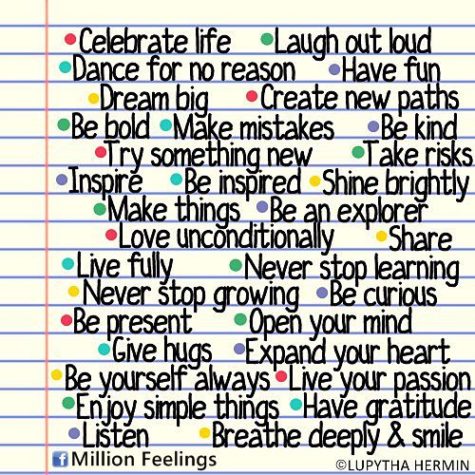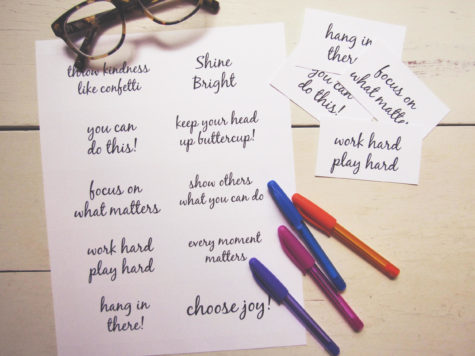How Long it Takes to Build a New Habit
My goal for this project was to create a good morning routine, and then to make that routine a daily habit. So far, I’ve found lots of good ideas, and now I’m just wondering how long it will take before my morning routine becomes an habitual behavior.
My research lead me to this article by James Clear:
Phillippa Lally is a health psychology researcher at University College London. In a study published in the European Journal of Social Psychology, Lally and her research team decided to figure out just how long it actually takes to form a habit.
The study examined the habits of 96 people over a 12-week period. Each person chose one new habit for the 12 weeks and reported each day on whether or not they did the behavior and how automatic the behavior felt.
Some people chose simple habits like “drinking a bottle of water with lunch.” Others chose more difficult tasks like “running for 15 minutes before dinner.” At the end of the 12 weeks, the researchers analyzed the data to determine how long it took each person to go from starting a new behavior to automatically doing it.
- The answer?
On average, it takes more than 2 months before a new behavior becomes automatic — 66 days to be exact. And how long it takes a new habit to form can vary widely depending on the behavior, the person, and the circumstances. In Lally’s study, it took anywhere from 18 days to 254 days for people to form a new habit.
In other words, if you want to set your expectations appropriately, the truth is that it will probably take you anywhere from two months to eight months to build a new behavior into your life — not 21 days.
Interestingly, the researchers also found that “missing one opportunity to perform the behavior did not materially affect the habit formation process.” In other words, it doesn’t matter if you mess up every now and then. Building better habits is not an all-or-nothing process.
- Finding Inspiration in the Long Road
Before you let this dishearten you, let’s talk about three reasons why this research is actually inspiring.
First, there is no reason to get down on yourself if you try something for a few weeks and it doesn’t become a habit. It’s supposed to take longer than that! There is no need to judge yourself if you can’t master a behavior in 21 short days. Learn to love your 10 Years of Silence. Embrace the long, slow walk to greatness and focus on putting in your reps.
Second, you don’t have to be perfect. Making a mistake once or twice has no measurable impact on your long-term habits. This is why you should treat failure like a scientist, give yourself permission to make mistakes, and develop strategies for getting back on track quickly.
And third, embracing longer timelines can help us realize that habits are a process and not an event. All of the “21 Days” hype can make it really easy to think, “Oh, I’ll just do this and it’ll be done.” But habits never work that way. You have to embrace the process. You have to commit to the system.
Understanding this from the beginning makes it easier to manage your expectations and commit to making small, incremental improvements — rather than pressuring yourself into thinking that you have to do it all at once.
- Where to Go From Here
At the end of the day, how long it takes to form a particular habit doesn’t really matter that much. Whether it takes 50 days or 500 days, you have to put in the work either way.
The only way to get to Day 500 is to start with Day 1. So forget about the number and focus on doing the work.
Tiny Habits
What is a “Tiny Habit”?
- A personal behavior
- Done at least once a day
- Takes less than 30 seconds
- Requires little effort
I love the idea of creating a series of “tiny habits” rather than trying to follow a possibly complex, rigid, or cumbersome morning routine. I’m thinking that something like this might work better for me because it’s so simple and flexible.
How To Start New Habits That Actually Stick
Your life today is essentially the sum of your habits.
- How in shape or out of shape you are? A result of your habits.
- How happy or unhappy you are? A result of your habits.
- How successful or unsuccessful you are? A result of your habits.
What you repeatedly do (i.e. what you spend time thinking about and doing each day) ultimately forms the person you are, the things you believe, and the personality that you portray.
But what if you want to improve? What if you want to form new habits? How would you go about it?
Turns out, there’s a helpful framework that can make it easier to stick to new habits so that you can improve your health, your work, and your life in general.
Let’s talk about that framework now…
Every habit you have — good or bad — follows the same 3–step pattern.
- Reminder (the trigger that initiates the behavior)
- Routine (the behavior itself; the action you take)
- Reward (the benefit you gain from doing the behavior)
I call this framework “The 3 R’s of Habit Change,” but I didn’t come up with this pattern on my own. It’s been proven over and over again by behavioral psychology researchers.
I first learned about the process of habit formation from Stanford professor, BJ Fogg. More recently, I read about it in Charles Duhigg’s best–selling book, The Power of Habit (audiobook).
Duhigg’s book refers to the three steps of the “Habit Loop” as cue, routine, reward. BJ Fogg uses the word trigger instead of cue. And I prefer reminder since it gives us the memorable “3 R’s.”
Regardless, don’t get hung up on the terminology. It’s more important to realize that there’s a lot of science behind the process of habit formation, and so we can be relatively confident that your habits follow the same cycle, whatever you choose to call it.
What a Habit Looks Like When Broken Down
Before we get into each step, let’s use the 3 R’s to break down a typical habit. For example, answering a phone call…
- Your phone rings (reminder).
This is the reminder that initiates the behavior. The ring acts as a trigger or cue to tell you to answer the phone. It is the prompt that starts the behavior.
- You answer your phone (routine).
This is the actual behavior. When your phone rings, you answer the phone.
- You find out who is calling (reward).
This is the reward (or punishment, depending on who is calling). The reward is the benefit gained from doing the behavior. You wanted to find out why the person on the other end was calling you and discovering that piece of information is the reward for completing the habit.
If the reward is positive, then you’ll want to repeat the routine again the next time the reminder happens. Repeat the same action enough times and it becomes a habit. Every habit follows this basic 3–step structure.
The 3 R’s of Habit Change
All habits form by the same 3–step process. Here’s an example: the traffic light turns green, you drive through the intersection, you make it closer to your destination. Reminder, routine, reward.
How can you use this structure to create new habits and actually stick to them? Here’s how…
- Step 1: Set a Reminder for Your New Habit
If you talk to your friends about starting a new habit, they might tell you that you need to exercise self–control or that you need to find a new dose of willpower.
I disagree.
Getting motivated and trying to remember to do a new behavior is the exact wrong way to go about it. If you’re a human, then your memory and your motivation will fail you. It’s just a fact.
This is why the reminder is such a critical part of forming new habits. A good reminder does not rely on motivation and it doesn’t require you to remember to do your new habit.
A good reminder makes it easy to start by encoding your new behavior in something that you already do.
For example, when I wrote about the secret to sticking to little healthy habits, I said that I created a new habit of flossing by always doing it after brushing my teeth. The act of brushing my teeth was something that I already did and it acted as the reminder to do my new behavior.
To make things even easier and prevent myself from having to remember to floss, I bought a bowl, placed it next to my toothbrush, and put a handful of pre–made flossers in it. Now I see the floss every time I reach for my toothbrush.
Setting up a visible reminder and linking my new habit with a current behavior made it much easier to change. No need to be motivated. No need to remember.
It doesn’t matter if it’s working out or eating healthy or creating art, you can’t expect yourself to magically stick to a new habit without setting up a system that makes it easier to start.
- How to Choose Your Reminder
Picking the correct reminder for your new habit is the first step to making change easier.
The best way I know to discover a good reminder for your new habit is to write down two lists. In the first list, write down the things that you do each day without fail.
For example…
- Get in the shower.
- Put your shoes on.
- Brush your teeth.
- Flush the toilet.
- Sit down for dinner.
- Turn the lights off.
- Get into bed.
You’ll often find that many of these items are daily health habits like washing your face, drinking morning tea, brushing your teeth, and so on. Those actions can act as reminders for new health habits. For example, “After I drink my morning tea, I meditate for 60 seconds.”
In the second list, write down the things that happen to you each day without fail.
For example…
- Traffic light turns red.
- You get a text message.
- A commercial comes on TV.
- A song ends.
- The sun sets.
With these two lists, you’ll have a wide range of things that you already do and already respond to each day. Those are the perfect reminders for new habits.
For example, let’s say you want to feel happier. Expressing gratitude is one proven way to boost happiness. Using the list above, you could pick the reminder “sit down for dinner” and use it as a cue to say one thing that you’re grateful for today.
“When I sit down for dinner, I say one thing that I’m grateful for today.”
That’s the type of small behavior that could blossom into a more grateful outlook on life in general.
- Step 2: Choose a Habit That’s Incredibly Easy to Start
Make it so easy you can’t say no.
—Leo Babauta
I’ve written about this before, but your life goals are not your habits.
It’s easy to get caught up in the desire to make massive changes in your life. We watch incredible weight loss transformations and think that we need to lose 30 pounds in the next 4 weeks. We see elite athletes on TV and wish that we could run faster and jump higher tomorrow. We want to earn more, do more, and be more … right now.
I’ve felt those things too, so I get it. And in general, I applaud the enthusiasm. I’m glad that you want great things for your life and I want to do what I can to help you achieve them. But it’s important to remember that lasting change is a product of daily habits, not once–in–a–lifetime transformations.
If you want to start a new habit and begin living healthier and happier, then I have one suggestion that I cannot emphasis enough: start small. In the words of Leo Babauta, “make it so easy that you can’t say no.”
How small? BJ Fogg suggests that people who want to start flossing begin by only flossing one tooth. Just one.
In the beginning, performance doesn’t matter. Become the type of person who always sticks to your new habit. You can build up to the level of performance that you want once the behavior becomes consistent.
Here’s your action step: Decide what want your new habit to be. Now ask yourself, “How can I make this new behavior so easy to do that I can’t say no?”
- What is Your Reward?
It’s important to celebrate. (I think that’s just as true in life as it is with habits.)
We want to continue doing things that make us feel good. And because an action needs to be repeated for it to become a habit, it’s especially important that you reward yourself each time you practice your new habit.
For example, if I’m working towards a new fitness goal, then I’ll often tell myself at the end of a workout, “That was good day.” Or, “Good job. You made progress today.”
If you feel like it, you could even tell yourself “Victory!” or “Success!” each time you do your new habit.
I haven’t done this myself, but some people swear by it.
- Floss one tooth. “Victory!”
- Eat a healthy meal. “Success!”
- Do five pushups. “Good work!”
- Give yourself some credit and enjoy each success.
Related note: Only go after habits that are important to you. It’s tough to find a reward when you’re simply doing things because other people say they are important.
- Where to Go From Here
In general, you’ll find that these three steps fit almost any habit. The specifics, however, may take some work.
You might have to experiment before you find the right cue that reminds you to start a new habit. You might have to think a bit before figuring out how to make your new habit so easy that you can’t say no. And rewarding yourself with positive self–talk can take some getting used to if you’re not someone who typically does that.
It’s all a process, my friend.
By James Clear
Early To Bed – Early To Rise
Buffer cofounder Joel Gascoigne takes his morning routine seriously. In fact, he calls it his “most rewarding habit.” Here, Joel shares the two most important changes you should make to kickstart your own consistent routine.
Here’s what he has to say:
Those who know me know that I love my morning routine. I’m always making adjustments to it, and at its core it revolves around waking up early (before sunrise), working on something important for 90 minutes, and then hitting the gym. I recently shared my most recent routine in a blog post about creating new habits.
Today, I want to share a couple of things I’ve neglected to mention in previous articles about my routine. These two aspects have enabled me to create a morning routine that has lasted several months, and it’s through my morning routine truly becoming habitual that I’ve seen massive benefits. I hope that these two insights can help you, too.
- Why wake up early in the first place?
Before I jump into those two key insights that helped me, I want to share some of my thoughts about why you might want to wake up early at all.
First, I’ve observed that many of the most successful people wake up early. In fact, I don’t know anyone who consistently wakes up before 6 AM and isn’t doing something interesting with their life. Some of the top CEOs are well known for waking up super early, many of them at 4:30 AM.
Additionally, I feel that waking up early sets the tone for my day of “making a choice.” If I leave it to fate as to when I roll out of bed, then I feel like that’s the outlook I’m taking in general. On the other hand, if I choose to get up early and do amazing things in those quiet hours, that’s when I feel like I’m grabbing hold of my life and controlling where I go. That’s the choice I want to make.
So, if you’re thinking about starting starting an early morning routine, here are two things which took me a while to notice:
- Craft your evening routine to get enough sleep
One of the most important things I’ve found when I’ve attempted to keep up an early morning routine for several days and weeks in a row, is that if I let my daily sleep amount get much below 7 hours for too many consecutive days, I’ll burn out sooner or later.
The best way I’ve found to counteract this is to decide how much sleep I need (for me it’s about 7.5 hours a night) and then figure out the exact time I need to be in bed. Once I’ve done this, I set up a 30 minute winding down ritual (for me, it’s going for a walk) which allows me to disengage from the day’s work and not have work in my head when I hit the pillow.
The key thing I’ve found is that in order to wake up early over a sustained period of weeks, this evening ritual is just as important as how much I think about my morning routine.
- Wake up early during weekends too
Another key aspect I’ve found to having a consistent early morning routine over a long period of time is to pay particular attention to the weekend as well as the week. I certainly believe that allowing imperfection and some slack at the weekend is important, but I personally made the mistake of having a weekend wake up time which was too divergent from my week day wake up time. Only once I started to think about the weekend, I hit a chain of many days of early mornings.
Once you’ve decided when you want to wake up during the week, I recommend that you don’t wake up much more than one hour later at the weekend. This also probably means that you still need to go to bed quite early on Friday and Saturday night. The problem arises when you wake up several hours later on Saturday and Sunday, and then want to wake up super early again on Monday.
The most likely thing is that Monday will be a little later, and Tuesday too. Perhaps by Wednesday you are back to your early morning waking time, but you won’t feel that magical state of gliding along, having several days in a row of early mornings and productive quiet hours. If you don’t try to wake up at a similar time at the weekend, it is similar to giving yourself jet lag every weekend. By waking up at a similar time at the weekend, you don’t stretch your body, and therefore you can achieve long term consistency with your morning routine.
- Related commentary:
Not everyone agreed with his observations, here’s the feedback on the original article.
” I’ve observed that many of the most successful people wake up early”
That’s confusing correlation with causality. There are people with such a personality that pushes them to be successful and also to be early risers, but there is not a cause-effect like in “I’m a loser, if I start waking up at 4AM, success will somehow start coming my way”
“I don’t know anyone who consistently wakes up before 6 AM and isn’t doing something interesting with their life”
Again correlation vs causality. People who are doing something interesting rise early because they can’t wait to start doing whatever they are being succesful at (probably something interesting they like).
Me, I’m more productive after 10PM (not only with work related stuff but also hobbies), but am forced to wake at 5 to be at work at 7. Still they pay me the same.
~Fik-of-borg (1/02/13)
Personally, I should introduce myself to the author, so he DOES know someone that wakes that early and still has a boring, 7-3 job.
It all comes down to personality type. Certain people have the “get up and start changing the world!” personality, and some people have the “why am I wake when the sun hasn’t risen yet…” personality. I’m somewhere in between, since I wake instantly but don’t feel any strong urge to do something major at that time of day.
~Balentius (1/02/13)
What do you think?
Where do you stand on the topic of getting up early and getting stuff done?
How To Create A Daily Routine
From The Spruce, we have this article that details 5 steps to creating a daily routine that works for you. It’s a bit too controlling for my taste, but it does have some ideas that I might be able to use. Enjoy!
This is all about figuring out what you need to get done and the best times to tackle each task. It’s a little bit art and a little bit science. The science is figuring out what you need to get done; the art is figuring out when to do it.
1. Brain Dump Time
The first step is to gather information on what you need to get done daily. Don’t worry about how you organize this list; this is a brain dump, not a to-do list. take 30 minutes with a legal pad and jot down everything you do each day (and everything you miss but should be doing). Better yet, carry around a small notebook and make notes all day long.
Capture all of the tasks you need to get done in a day. If you already have a routine, you can divide these into the following:
- Tasks you already do that work well for you
- Tasks you need to add into your routine
If you’re starting from scratch, begin by answering these questions:
- What tasks do you need to complete each day in order to get to work?
- Which tasks do you need to do each day to get your kids to school?
- Which tasks do you need to do each day to eat?
- Which errands do you need to get done daily?
- Which tasks need to get done each done in order for you to get some exercise?
- Which tasks do I need to get done to maintain an organized home?
Make the list. In the beginning, nothing is too small, if you want to work “brush teeth” into your routine, that’s great. When I was creating mine, I found it much easier to throw everything in and edit out later.
2. Create a Timetable
Now assess your energy levels. Think about when you do your best work. Most people have greater energy for creative thinking in the morning because self-control depletes throughout the day. It’s important to schedule your “big thinking”
With that in mind, here are some guidelines:
- Morning
Mornings about getting out the door, which is itself a challenge, especially if you have children. I like to get out the door as quickly possible because I know I do my best work in the morning.
Reserve the mornings for the tasks that require the most critical thinking and troubleshooting. If you’re a writer, make sure you have time to write in the morning.
- Midday
This is a very powerful time of day because your energy (and coffee high) has likely dissipated. This means you’re primed to do the really boring, routine stuff. Use this time for tasks like answering emails, setting appointments, researching necessities like directions to upcoming appointments and recipes, and run some errands if you have time (post office, dry cleaner, bank, etc.)
- Evening
Evenings are for planning and preparation for the next day: put your “get ready” activities like laying out your clothes, packing lunches, and decluttering in the evening.
3. Add in Some Flexibility for Exceptions
Your work process or schedule may not fit neatly into this, and that’s OK; the point is to harness your most productive times to use for your most challenging tasks, and your least productive times to do the more mundane tasks.
What I found while researching daily routines is that a lot of very successful people work all night long and sleep all day. If that’s you, that’s fine!
4. Put it All Together
Now match up your activities with times. Start with anything that has to be done at a certain time each day (like picking your kids up a school or eating lunch). Then slot in tasks based on when you think it makes the most sense to tackle them. To make this easier on you, I’ve created a standard daily routine checklist.
You can use this as a draft to work off of, or cut and paste into your own document. You’ll find it at the bottom of this post.
5. Test Drive
Take our new routine for a test drive for 30 days. How does it feel? Did you schedule your tasks at activities at times that makes sense? Do you need to adjust things?
Adjust anything that is not working on a case-by-case basis. Then do an assessment after 30 days to see how your new routine is working for you.
Sample Checklist
Surgeons use checklists, pilots use checklists, and you should be using checklists as well. Following a checklist allows you to focus more on getting things done rather than wasting precious brain space on:
- What you need to accomplish
- What you’ve already accomplished
- Keep track of your daily tasks with this printable Daily Routine checklist.
Morning Checklist
I front-load the Daily Checklist with most of the tasks to be completed in the evening. This way you can get out the door more quickly in the morning:
Bathroom
- ____ Grooming
- ____ Wipe the sink
Bedroom
- _____ Dress
- _____ Make Bed
- _____ Tidy night table
Kitchen
- ____ Prepare and eat breakfast(s)
- ____ Defrost ingredients for dinner
- ____ Pack lunches
Launch pad
- ____ Check work bag for keys, cell phone, work papers
- ____ Check school bags
Midday Checklist
Whether you work in an office or at home, I suggest completing the following either right before or right after your lunch break:
Desk / Computer
- ____ Check in with To Do list
- ____ Schedule appointments
- ____ Clean out 5 personal emails from your inbox
- ____ Respond to meeting requests, evites and invitations
- ____ Check your calendar. Are there any birthdays/anniversaries/important dates this week/next week?
Errands
- ____ Bank: Banking/ATM
- ____ Post Office: Do you have anything to mail? Stamps?
- ____ Drugstore: Toiletries, greeting cards, odds & ends
- ____ Dry cleaner
Evening Checklist
My #1 tip for successfully checking off this list is to start these tasks the minute you walk in the door. I personally go straight into the kitchen. Don’t wait until you’re half asleep on the couch to begin your evening routine.
Kitchen
- ____ Prepare dinner
- ____ Add items to running grocery list
- ____ Check in with your menu plan for the week
- ____ What’s for lunch tomorrow?
- ____ What are tomorrow’s snacks?
- ____ What’s for dinner tomorrow?
- ____ Pack lunch bags
- ____ Wipe down kitchen counters
Launch pad
- ____ Pack/refresh work bags
- ____ Pack/refresh gym bags
Bedroom
- ____ Lay out clothes for next day
- ____ Tidy the night table
- ____ Create tomorrow’s To Do list
Bathroom
- ____ Evening grooming
- ____ Wipe down sink
Extra credit
Extra credit tasks are for days when you have either extra time, or extra energy.
- ____ Choose one room and declutter for 10 minutes
- ____ Respond to 5 more personal emails
- ____ Tackle a 30 Minute organizing Project
- ____ Make it a laundry day
Once you have the basics down and begin following your routine, don’t be afraid to make adjustments when something is not working.
Morning Memories
One of the reasons I believe in the importance of a good morning routine comes from my childhood. My parents got up every morning at 5:30 am. My mom would light a candle and make coffee. They would chat, plan the day, my mom would write a list or two… or three. They would read the bible and pray.
Every morning this could be counted on. My mom loved sitting by the window, watching the sun come up, and birds at the feeders or in the trees. My dad was more active and pretty soon he’d be outside… This routine gave their lives a consistency, a deep thread of continuity, and a certain integrity. Things I have longed for and fought against for most of my life.
What about you? What morning routines did you grow up with? What examples did you see modeled in your formative years? Are there pieces of things that you remember that you’d like to include today? Pieces that have somehow wormed their way into your mornings that you’d like to throw away? Is there some way to take the unwanted parts of your current routine and turn them into something different? Something better?
Before You Get Out Of Bed
When You Really Don’t Feel Like It
This post is something I found, but never posted when we were working on our The Little Engine That Could project, so it’s not exactly a morning routine, but it occurs to me that once I do have the “perfect” morning routine in place, I might find myself at odds with it. Suppose I wake up in the morning and I really don’t feel like doing any of it… then what? So, here we have an article on how to get shit done even when you’re totally unmotivated.
How to Get Shit Done Even When You Really Don’t Feel Like It
When I first started my business, I was surprised that getting clients and making a decent income — the things I feared most — weren’t all that difficult. Instead, the thing that plagued me was actually pretty simple: finding the motivation to actually do the work I’d been given. It might sound ridiculous, but after chatting with enough freelancers, I can tell you this: it’s a common problem. Nowadays, I’m able to get A LOT more done (even when I totally don’t feel like it!). Today’s tips are lessons I learned over the past year (the hard way), which have drastically increased my productivity, motivation, and will to get shit done. Leh do dis.
- Figure out what you’re afraid of
When I first started out, I had a subconscious fear that my work was going to take a looooong time to finish. Someone wants a new blog design? BRB, see you in a year! I’d built up unreasonable fears about how long the work would take to do and in turn, pushed it off over and over again.
My solution? I wrote out how long I thought each item on my to-do list would take and then I timed myself! I was shocked (shocked!) when my estimates were often 2-3 times longer than the task actually took. It was incredibly motivating to see how quickly I was able to work. This simple activity helped me prioritize my days ever since. What’s really holding you back from doing your work? Fear of how long it will take? Too much pride about not being able to deliver something spectacular enough? The answer might reveal a whole lot!
- Use the 20 second rule
Want to get shit done? Make it 20 seconds easier to do. In The Happiness Advantage, author Shawn Achor describes a simple strategy for developing better habits and doing things even when we don’t feel motivated. Achor says, “Lower the activation energy for habits you want to adopt, and raise it for habits you want to avoid. The more we can lower or even eliminate the activation energy for our desired actions, the more we enhance our ability to jump-start positive change.” So the next time you decide to skip the gym? Try laying out your workout gear the night before.
- Cut yourself off from social media
It’s no wonder we can’t get things done when we spend hours of everyday staring mindlessly at a screen that magically sends us funny pictures and updates from our friends. (If given the choice between work and text from dog, one will always choose text from dog). Make it easier on yourself and tune out of social media. Turn off notifications on your phone. Set specific times that you’re allowed to check social media sites (and ONLY check at these times). I think you’ll find that when you hush the chatter of the online world, you’re able to get back into the groove of that pesky to-do list that’s been giving you side eyes since last week.
- Recognize when you’re at the top of your game
Dudes. I am pretty useless in the late afternoon. Awhile back, I used to start my day with emails, social media, and small, mindless tasks, which meant that I was doing The Big Stuff in the afternoon…when I was tired and not functioning at my best. Figure out when you feel and work your best and then do all of the things that take the most brain power during those times. Twitter can wait. Promise.
- Create rewards
I’ll be honest, rewards never worked for me, but I do know they work for other people. Tell yourself that once you finish X, you can have/do Y. Another alternative is to reward yourself with something (like a small piece of candy) whenever you knock an item off your to-do list.
- Organize that hot mess of yours
There is nothing less motivating to me than a completely messy desk. Luckily, this is a simple fix! Spend 15 minutes organizing your work area and cleaning up all that shiz of yours. When your work space is clear, your mind is clear.
- Give up
I thought we’d end on an inspirational note. ? But seriously, some days you’re just not going to feel it and pushing yourself to work when you absolutely CAN’T will probably only result in mediocre results and even more overwhelm. Play hooky for the day or a few hours. Relax. Take a freakin’ break. Try a few things from this list. I promise you’ll feel a whole lot better tomorrow, you little hustler you.
The LOL Cat Routine
……i wokez up early
n den… i said HELLO to you
n den… i eated some nomz
n den… i climbed stuff
n den… i pooped
n den… i napped
n den… i eated more nomz
n den… i saw a bug
n den… i had a drink ob water
n den… i climbed stuff again
n den… i finded a pop corm
n den… i napped some morez
n den… i pooped again
n den… i eated more nomz
n den…… Youz Came Home!
Give Yourself Permission
Here is a nifty little creative project that I think would make a great addition to any morning routine. I found it in the book Living Out Loud, and it looks pretty easy. The premise is to live your life on purpose daily. Here’s what she has to say about it: “Permission Cards take the frenzy out of your hectic existence and give you permission to do what you REALLY want.”
The book has a tear out page with lots of little “permission slips,” but I thought it would be really fun to make our own. You can use 3 x 5 cards and cut them into quarters, thirds, or whatever shape you like. On one side write an activity that appeals to you.
Here is a list of the permission slips from the book. Feel free to make up a bunch more of your own:
Meditate * Nap * Heal * Vent * Forgive * Play * Change * Try * Recharge * Inspire * Begin * Embrace * Simplify * Create * Receive * Trust * Dream * Invent * Smile * Wish * Bloom * Grow * Love * Transform * Dance * Choose * Express * Empower * Contribute * Investigate * Let Go * Accept * Laugh
You don’t have to stick to one word permissions. Here are some other ideas:
Hurry slowly * Make mistakes * Go back to bed * Be outrageous
Make a mess * Whine and Complain * Say what I think * Play all day
Leave them plain and simple, or decorate each one with markers or stickers. If you enjoy creative projects, you can go all out with these, but if you just want something and utilitarian, it doesn’t have to be fancy at all.
Directions:
- Make the cards
- Place the cards in a bowl
- Close your eyes and pick one. (The one that you need will stick to your fingers.)
- Say out loud, “I now have permission to _____________.”
Easy peasy… be a fun way to start the day, don’t you think?
Related Posts
Posts
- Radical Self Care Project Overview by shirleytwofeathers - No Comment
- Radical Self Care Image Gallery by shirleytwofeathers - No Comment
- It’s A Wrap by shirleytwofeathers - 3 Comments
- Something To Consider by shirleytwofeathers - 1 Comment
- Nurturing Your Precious Self by shirleytwofeathers - 3 Comments
B. Joy Barrett: beautiful-turquoise-upholstered-accent-chair-for-living-room-with-within-colorful-accent-chairs-colorful-accent-chairs-transforms-the-look-of-a-room
Claudette Losier: Why Does It Work?
me: Make Your Own Violet Fire
Abdulrahman: Money Chant – Very Fast
Shirley Twofeathers: It’s A Wrap

